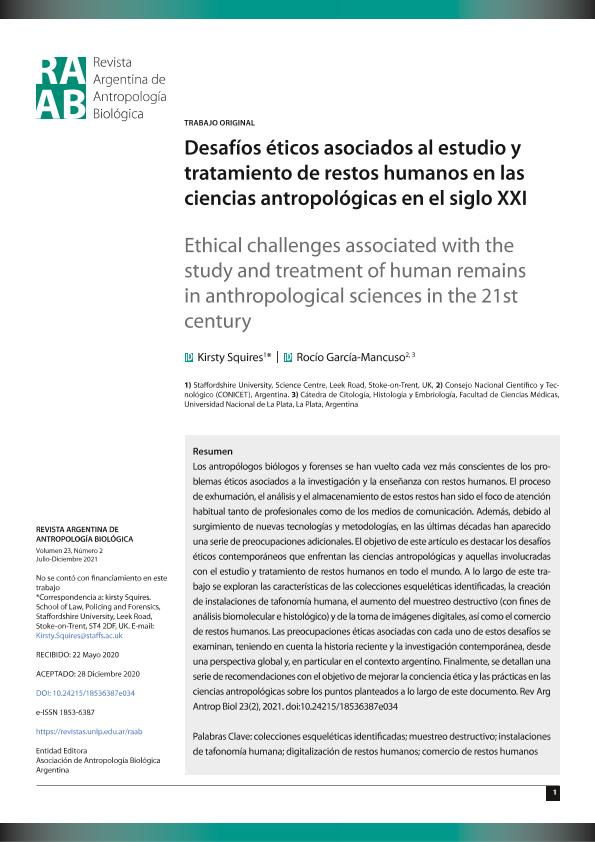Artículo
Los antropólogos biólogos y forenses se han vuelto cada vez más conscientes de los problemas éticos asociados a la investigación y la enseñanza con restos humanos. El proceso de exhumación, el análisis y el almacenamiento de estos restos han sido el foco de atención habitual tanto de profesionales como de los medios de comunicación. Además, debido al surgimiento de nuevas tecnologías y metodologías, en las últimas décadas han aparecido una serie de preocupaciones adicionales. El objetivo de este artículo es destacar los desafíos éticos contemporáneos que enfrentan las ciencias antropológicas y aquellas involucradas con el estudio y tratamiento de restos humanos en todo el mundo. A lo largo de este trabajo se exploran las características de las colecciones esqueléticas identificadas, la creación de instalaciones de tafonomía humana, el aumento del muestreo destructivo (con fines de análisis biomolecular e histológico) y de la toma de imágenes digitales, así como el comercio de restos humanos. Las preocupaciones éticas asociadas con cada uno de estos desafíos se examinan, teniendo en cuenta la historia reciente y la investigación contemporánea, desde una perspectiva global y, en particular en el contexto argentino. Finalmente, se detallan una serie de recomendaciones con el objetivo de mejorar la conciencia ética y las prácticas en las ciencias antropológicas sobre los puntos planteados a lo largo de este documento. Biological and forensic anthropologists have become increasingly aware of the ethical issues associated with research and teaching involving human remains. The process of exhumation, the analysis and the storage of remains have been the focus of regular attention from professionals and the media. Furthermore, due to the emergence of new technologies and methodologies, a number of additional issues have emerged over the past two decades. The aim of this article is to highlight the contemporary ethical challenges that the anthropological sciences and those involved in the study and treatment of human remains around the world are confronted with. Throughout this article, the characteristics of identified skeletal collections, the creation of human taphonomy facilities, the increase in destructive sampling (for biomolecular and histological analysis) and the use of digital imaging are explored, as well as the trade of human remains. Ethical concerns associated with each of these challenges are examined from a global perspective and within the Argentine local context. These issues are summarized taking recent history and contemporary research into account. Finally, on the basis of the topics raised throughout this article, a list of detailed recommendations is provided with the aim of improving ethical awareness and practice in anthropological science.
Desafíos éticos asociados al estudio y tratamiento de restos humanos en las ciencias antropológicas en el siglo XXI
Título:
Ethical challenges associated with the study and treatment of human remains in anthropological sciences in the 21st century
Fecha de publicación:
07/2021
Editorial:
Asociación de Antropología Biológica Argentina
Revista:
Revista Argentina de Antropología Biológica
ISSN:
1853-6387
e-ISSN:
1514-7991
Idioma:
Español
Tipo de recurso:
Artículo publicado
Clasificación temática:
Resumen
Archivos asociados
Licencia
Identificadores
Colecciones
Articulos(CCT - LA PLATA)
Articulos de CTRO.CIENTIFICO TECNOL.CONICET - LA PLATA
Articulos de CTRO.CIENTIFICO TECNOL.CONICET - LA PLATA
Citación
Lucas, Kirsty; Garcia Mancuso, Rocio; Desafíos éticos asociados al estudio y tratamiento de restos humanos en las ciencias antropológicas en el siglo XXI; Asociación de Antropología Biológica Argentina; Revista Argentina de Antropología Biológica; 23; 2; 7-2021; 1-22
Compartir
Altmétricas




